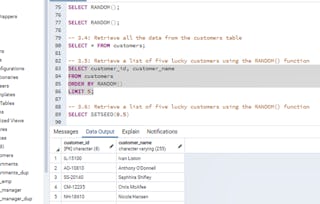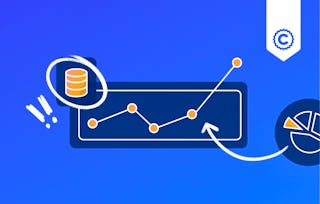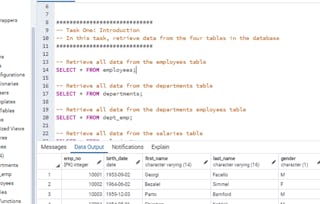In this 2-hour long project-based course, you will learn how to retrieve data from tables in a database using SQL SELECT statement with SQL Aggregate functions. The aggregate functions we will consider in this project are COUNT, SUM, MIN, MAX and AVG. Aggregate functions are used to summarize data from rows of a table into a single value. In addition, you will learn how to set conditions on the output of an aggregate function using the HAVING clause. Finally, you will learn how to tidy up the result set of aggregate functions using the ROUND function.

Performing Data Aggregation using SQL Aggregate Functions
Seize the savings! Get 40% off 3 months of Coursera Plus and full access to thousands of courses.

Performing Data Aggregation using SQL Aggregate Functions

Instructor: Arimoro Olayinka Imisioluwa
5,423 already enrolled
Included with
(79 reviews)
Recommended experience
What you'll learn
Retrieve data as summaries from tables of a database using SQL aggregate functions
Understand how to set conditions on the result set of an aggregate functions using the HAVING clause
Skills you'll practice
Tools you'll use
Details to know

Add to your LinkedIn profile
Only available on desktop
See how employees at top companies are mastering in-demand skills

Learn, practice, and apply job-ready skills in less than 2 hours
- Receive training from industry experts
- Gain hands-on experience solving real-world job tasks
- Build confidence using the latest tools and technologies

About this Guided Project
Learn step-by-step
In a video that plays in a split-screen with your work area, your instructor will walk you through these steps:
-
Retrieve data from the employees database
-
Retrieve data from the employees database using the COUNT function
-
Select distinct data from fields of a table and use the GROUP BY statement
-
Use the HAVING clause to set conditions on aggregate functions
-
Retrieve data from the employees database using the SUM function
-
Retrieve data from the employees database using the MIN & MAX functions
-
Retrieve data from the employees database using the AVG function
-
Use ROUND to tidy up the result set of aggregate functions
Recommended experience
Familiarity with querying databases using SQL SELECT statement
4 project images
Instructor

Offered by
How you'll learn
Skill-based, hands-on learning
Practice new skills by completing job-related tasks.
Expert guidance
Follow along with pre-recorded videos from experts using a unique side-by-side interface.
No downloads or installation required
Access the tools and resources you need in a pre-configured cloud workspace.
Available only on desktop
This Guided Project is designed for laptops or desktop computers with a reliable Internet connection, not mobile devices.
Why people choose Coursera for their career

Felipe M.

Jennifer J.

Larry W.

Chaitanya A.
Learner reviews
- 5 stars
78.75%
- 4 stars
17.50%
- 3 stars
3.75%
- 2 stars
0%
- 1 star
0%
Showing 3 of 79
Reviewed on Jan 11, 2021
Class was good. I couldn't find the answer to one of the quiz questions even after going back to the lesson referring to it.
Reviewed on Dec 29, 2020
A complete and easy to understand course on SQL aggregate function.
Reviewed on Jun 23, 2022
Instructor was very good and covered topics quickly and thoroughly
You might also like

Coursera
 Status: Preview
Status: Preview

Open new doors with Coursera Plus
Unlimited access to 10,000+ world-class courses, hands-on projects, and job-ready certificate programs - all included in your subscription
Advance your career with an online degree
Earn a degree from world-class universities - 100% online
Join over 3,400 global companies that choose Coursera for Business
Upskill your employees to excel in the digital economy
Frequently asked questions
By purchasing a Guided Project, you'll get everything you need to complete the Guided Project including access to a cloud desktop workspace through your web browser that contains the files and software you need to get started, plus step-by-step video instruction from a subject matter expert.
Because your workspace contains a cloud desktop that is sized for a laptop or desktop computer, Guided Projects are not available on your mobile device.
Guided Project instructors are subject matter experts who have experience in the skill, tool or domain of their project and are passionate about sharing their knowledge to impact millions of learners around the world.



